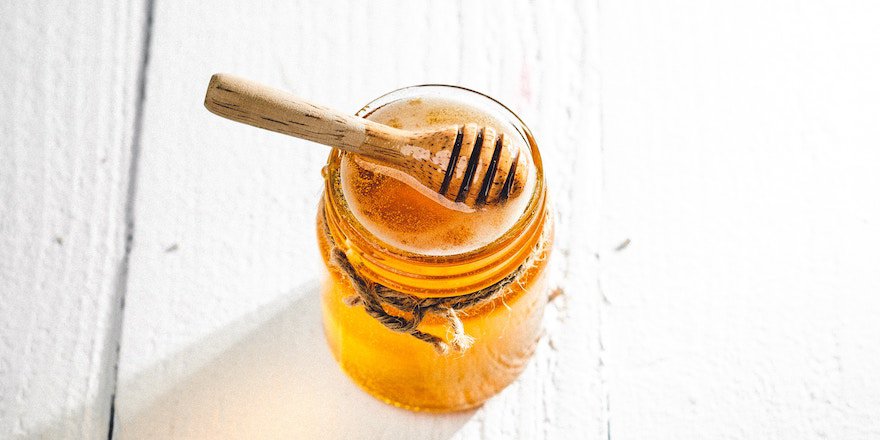Honey has many medicinal uses. A term has even been coined from its therapeutic uses: apitherapy.
To understand its potential to combat heartburn, it is essential to understand your symptoms. This stomach acidity, also called “pyrosis,” is the result of gastric fluid rising to the esophagus.
These gastroesophageal refluxes cause varying degrees of burning sensations in the chest or throat, often occurring at night or after meals, along with respiratory discomfort or an unpleasant taste.
Honey offers a natural alternative to reflux medications, antacids or PPIs, which are highly controversial today. To soothe acid reflux, I share with you several tips on using honey and adopting good habits.
📚 Read also | A pharmacist helps us choose the best digestive enzymes
Honey, a natural antacid of interest to science
Honey reduces inflammation
The generous composition of honey, detailed below, provides numerous benefits: antimicrobial, immune-stimulating, healing, antiseptic, anti-inflammatory, antioxidant, anti-diabetic, detoxifying and soothing.
It is also a natural ally for digestion by protecting the stomach and esophageal linings. Against heartburn, honey acts by limiting cellular inflammation caused by free radicals.
A synergy of bioactive agents
Many scientific studies have delved into the protective mechanisms of honey. Several have highlighted its effects on gastrointestinal health due to the synergy of its bioactive agents.
A first study shows that dandelion honey could reduce the harmful effects of gastric acidity by about 50%. If honey helps reduce acid reflux, it is thanks to a “barrier effect”.
An action against gastroesophageal reflux
Another study published in 2001 highlights the positive action of honey in relieving GERD (gastroesophageal reflux disease).
Honey can also be effective against ulcers and gastritis. Its strong anti-pathogenic power inhibits Helicobacter pylori, the bacterium responsible for these conditions.
Natural honey has a low pH, which gives it a high acidity. Often mistakenly thought harmful for soothing these ailments, it is actually this pH and its complex composition that make it gentle and capable of combating gastric disorders.
The nutritional properties of honey
Even though the nutritional content of honey varies according to the flowers foraged, it typically contains 74 to 80% carbohydrates. These sugars are what give it such a delicious sweetness.
Other nutrients make up this product of the hive:
- 20% water
- minerals and trace elements
- proteins
- vitamins of the B group
- vitamin C
A high antioxidant power
Honey also has an invaluable concentration of antioxidants, mainly in the form of flavonoids: chrysin, polyphenols, quercetin …
Other biochemical compounds make it up, like digestive enzymes (glucose oxidase, diastase, peptidase…), as well as organic acids and antibiotic molecules.

My tips for using honey in case of heartburn
You can choose different varieties of honey to reduce heartburn: dandelion honey, acacia honey, buckwheat or sunflower honey.
As soon as you feel bothered by acid reflux, serve yourself an infusion with ginger and turmeric. Then, stir in a tablespoon of the honey of your choice.
You can consume 3 to 4 tablespoons of honey per day for two days to naturally prevent acid reflux in the stomach. In a warm drink rather than too hot or in a gourmet recipe: in your yogurt, in cooking your vegetables or on almonds for example.
Other dietary rules in case of heartburn are essential:
- avoid lying down directly after a meal, and at night, prefer sleeping with an extra pillow to elevate your head
- limit tobacco, alcohol, coffee, and highly spicy foods
- prefer eating small portions several times a day rather than large meals
For children under one year, I strongly advise against introducing honey to avoid any allergic reactions to bee products and any risk of infection from certain bacteria.
If symptoms persist, consult your doctor to determine the cause of these heartburns.
📚 Read also | What you need to know before buying royal jelly
Sources and scientific studies
Molan P, 1999. Why honey is effective as a medicine. Its use in modern medicine.
Baltuskevicius A, Laiskonis A, Vysniauskiene D, Ceksteryte V, Racys J, 2001. Use of different kinds of honey for hepatitis A treatment and for reduction of increased acidity of gastric juice.
Al Swayeh OA, Ali ATMM, 1998. Effect of ablation of capsaicin sensitive neurons on gastric protection by honey and sucralfate. Hepato-Gastroenterol.
John de Caestecker, 2001. Oesophagus: Heartburn.
Palma-Morales et al. 2023. A Comprehensive Review of the Effect of Honey on Human Health. Nutrients.
Zamri et al. 2023. Honey on brain health: A promising brain booster.



